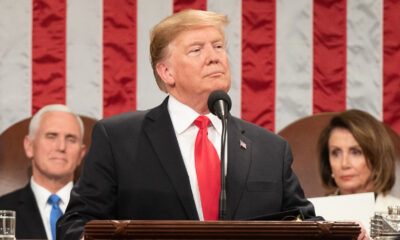Executive
Spotlight on China Risk: Corporate America Wakes Up
Corporations in America are belatedly waking up to the extra risk of doing business with and in China as a new administration comes in.
As the U.S. prepares for a shift in China strategy during the Trump Administration, corporate America is likewise reassessing its relationship with the geopolitical giant. From General Motors’ $5 billion write-down to IBM’s decision to move R&D out of the country, corporations are waking up to the investment risk posed by China – but they are years too late.
Strive warned of the China challenge
From voting our shares to direct appeals to companies’ CEOs, we at Strive have demanded corporate America protect American investors from the challenges posed by the Chinese Communist Party. While companies are now heeding our call as the next trade war brews, a long road lies ahead.
Since the company’s inception, we have led the charge to mitigate China risk. When Starbucks vowed in 2022 to open a new store in China every nine hours for the next three years, Strive warned Starbucks against this move, highlighting the material risks to shareholders.
Fast forward to Starbucks’ latest earnings call, where new Starbucks CEO Brian Niccol addressed its disappointing fourth-quarter results, reporting a dip in earnings and revenue, which included a 14% sales decline in China. What was their solution? According to Starbucks, the “best path to growth” in the region may be through local partnerships; a model McDonald’s has adopted, which carries its own risks.
Since day one, Strive has been clear that China risk is investment risk. As we warned in our white paper on China risk in the fall of 2023,
The CCP dictates the terms on which American companies can operate, including imposing forced technology transfers, censorship policies, regulatory policies, sanctions, and tariffs that harm long-term shareholder value.
BlackRock sounds the China alarm
Other investors are now belatedly looking to follow our lead. This fall, BlackRock CEO Larry Fink finally sounded the alarm on China. Warning companies to “re-evaluate” their ties to the country due to its support of Russia’s invasion of Ukraine – and after years of pinning his own company’s future on business opportunities in the communist country (BlackRock letter; FT article) – Fink called on companies to begin examining their Chinese business dealings as they would any other potential business risk.
Weeks later, McKinsey axed projects associated with Chinese local government clients. In doing so, the U.S.-based consulting firm reportedly cut nearly 500 jobs from its China unit, signaling a shift away from the country after 30 years building its presence there. And on November 7, shoemaker Steve Madden announced its plan to reduce its China imports as much as 45 percent to avoid likely tariffs under a second Trump term.
While we welcomes corporate America’s emerging concern regarding the changing geopolitical landscape in China, such risk mitigation measures are long overdue and are just scratching the surface of what needs to be done.
Aside from China’s egregious censorship policies, heavy-handed corporate regulations, and intellectual property theft, the cost of doing business with China is increasing as the West continues to decouple. Under the Trump Administration, reformed landscapes in trade, tech, and Taiwan may further squeeze an already strained Chinese economy.
The new administration
Preparations for the new administration are already underway within the U.S. semiconductor industry, which is particularly exposed to national security risks. California-based companies Applied Materials and Lam Research are slashing Chinese vendors from their supply chains.
With the looming shift in the U.S.-China relationship, companies must do more than simply outwardly acknowledge such risks; they owe it to shareholders to fully and transparently disclose their China operations to paint an accurate picture of their risk exposure.
This past proxy season, Strive voted for a shareholder proposal at McDonald’s that sought an assessment on how the company maintains its reputation, viability, and profitability given its partnerships with Chinese state-owned entities. According to the proponent, “the Company is more than just a restaurant operator in the country; McDonald’s is in a minority partnership (48%-52%) with Chinese state-owned CITIC Capital,” presenting additional financial and operational risks to the fast-food giant.
As investors demand ‘ex-China’ strategies, conversations surrounding these risks should not exclusively occur behind closed doors among corporate insiders. Shareholders deserve full disclosure of whether their money is being used to drive their company deeper into an increasingly precarious Chinese market.
This article was originally published by RealClearMarkets and made available via RealClearWire.
Sarah Rehberg is director, corporate governmance, at Strive Asset Management.
-

 Civilization4 days ago
Civilization4 days agoLow birth rate – does anyone get it?
-

 Executive4 days ago
Executive4 days agoWaste of the Day: Lil Wayne, Chris Brown Spent Covid Millions on Themselves
-

 Civilization4 days ago
Civilization4 days agoIsrael Thwarts External Threats While Amplifying Internal Ones
-

 Accountability4 days ago
Accountability4 days agoThe Climate Agenda’s March Through the Institutions: Can It Be Stopped?
-

 Accountability4 days ago
Accountability4 days agoVMI’s Integrity at Stake
-

 Civilization4 days ago
Civilization4 days agoJay Bhattacharya Will Bring Much-Needed Transparency to NIH
-

 Civilization2 days ago
Civilization2 days agoRGGI Is Unconstitutional, Harmful, and Useless
-

 Civilization2 days ago
Civilization2 days ago‘It’s All Talk’: Trump Accuses Biden of Sabotaging ‘Smooth Transition’













